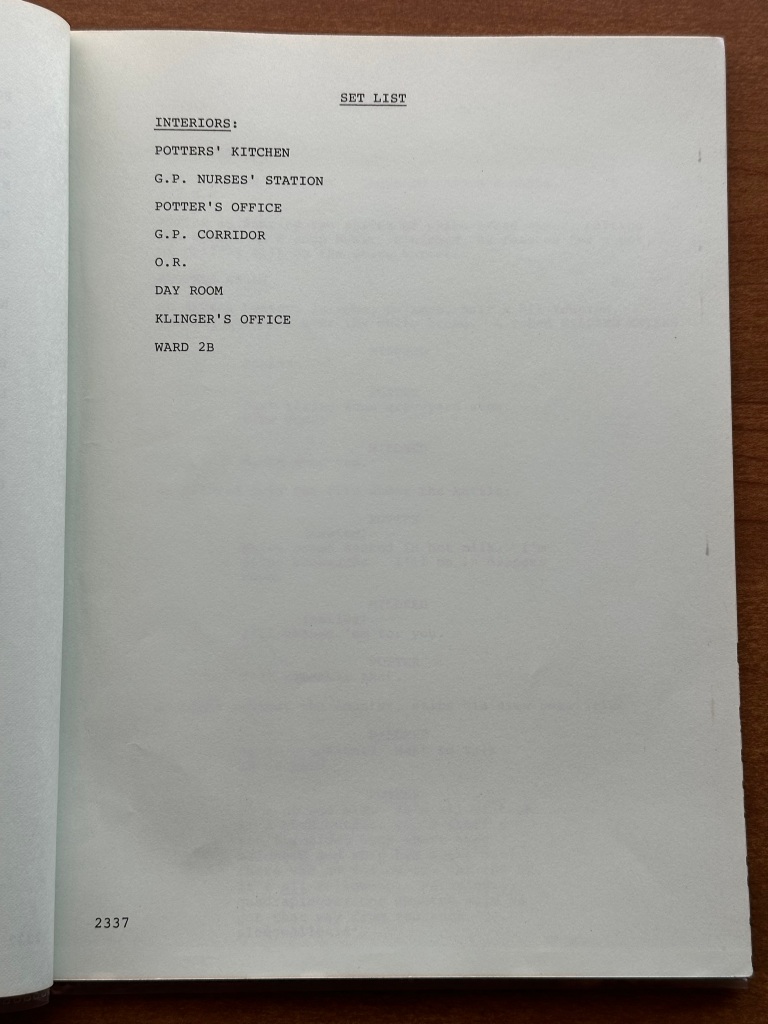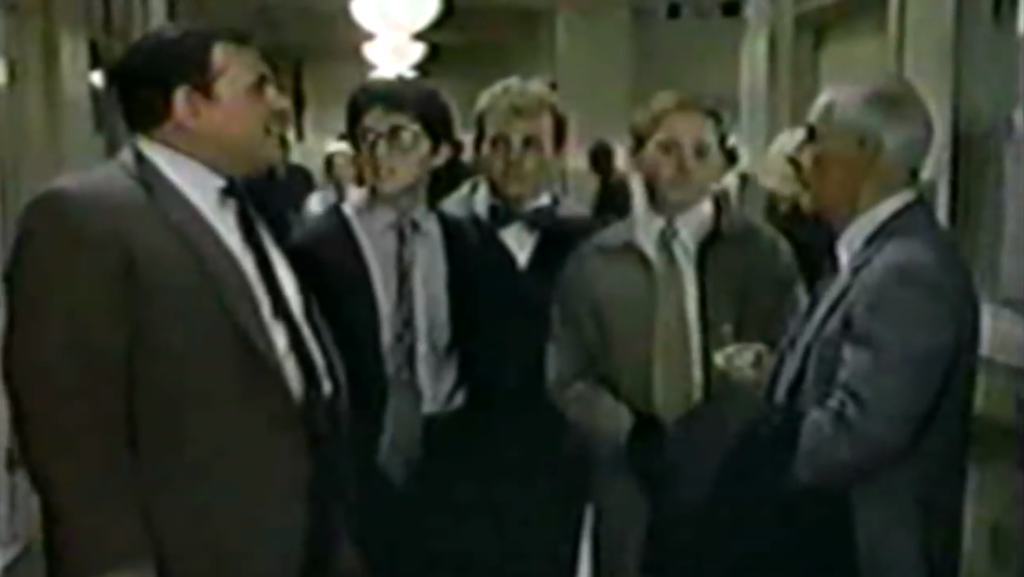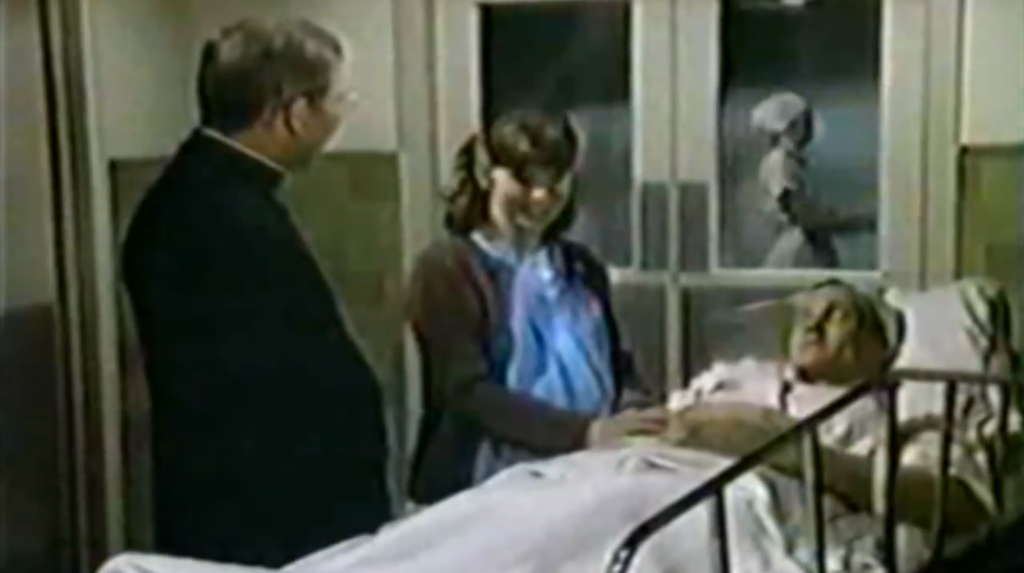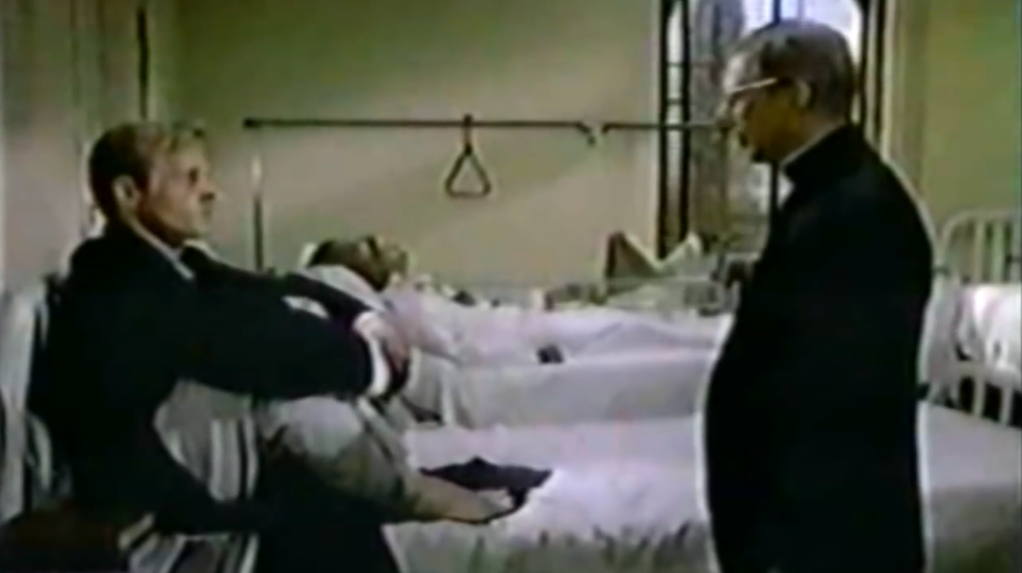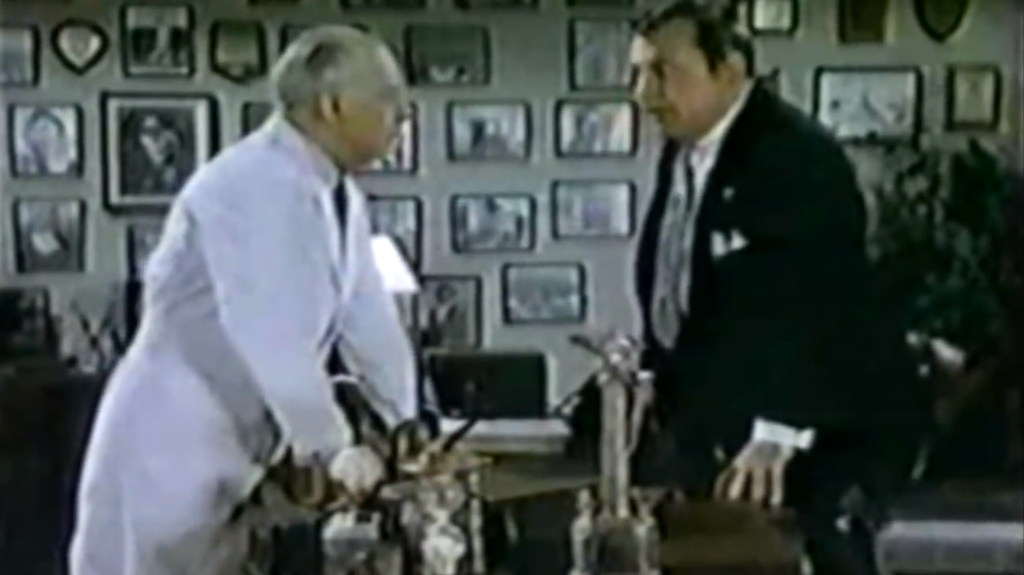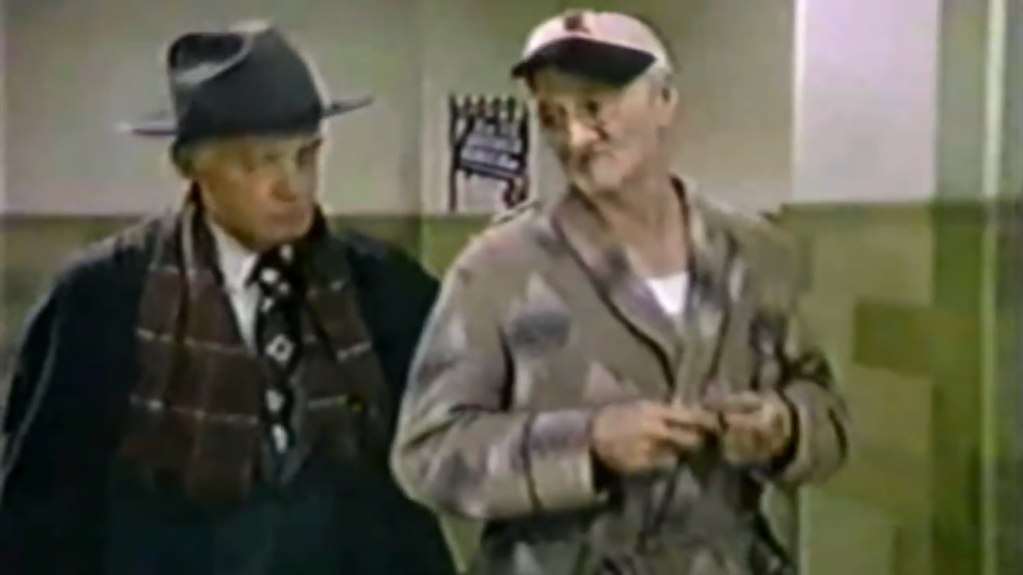UPDATE (5/1/2024) – I contacted the University of Georgia archive that oversees the collection for the Peabody Awards, and they confirmed that AfterMASH was NOT nominated for a Peabody Award at any time during the series’ run.
UPDATE (4/29/2024) – An earlier version of this post stated that the episode “Fallout” earned Larry Gelbart a Peabody Award. There are several M*A*S*H books and articles that reference this fact, but it cannot be proven. I have removed the reference from the body of the text. The episode was nominated for an Emmy award in 1984, and M*A*S*H won a Peabody award in 1975.
Looking back over the last two years of writing for this site, I am surprised that I haven’t written a post related to the M*A*S*H spin-off series AfterMASH (I did write a post about a script from Trapper John, M.D.). The series took place in a Missouri veterans hospital following the conclusion of the Korean War in 1953. AfterMASH was a period comedy set in a veterans hospital, and while that was not the most successful premise, the series did have a few moments when it came close to capturing the voice of M*A*S*H. However, AfterMASH never quite lived up to the series that spawned it despite starring three of the original actors: Harry Morgan, Jamie Farr, and William Christopher. AfterMASH aired on CBS for two season, but it had the opposite trajectory as M*A*S*H as it debuted as the highest rated show of the new season in September 1983, and it quickly dropped in the ratings as it lost viewers. This week, let’s explore AfterMASH and one of its episodes.
AfterMASH
AfterMASH aired on CBS beginning in September 1983 and ended in early 1985. The series, like M*A*S*H, was produced by Twentieth Century Fox Television, and, at first, took over the CBS time slot held by M*A*S*H in its 11th season. The series followed M*A*S*H regulars Col. Potter (Morgan), Max Klinger (Farr), and Father Mulcahy (Christopher) as they transitioned to life back in the United States. Soon-Lee Klinger (Rosalind Chao) was a series regular following her marriage to Klinger in the M*A*S*H series finale. The show took place at the General Pershing Veterans’ Hospital in River Bend, Missouri. In the pilot episode, we learned that Col. Potter was restless following the end the Korean War, and he takes a job at the hospital. He eventually gets Klinger and Father Mulcahy to join him.
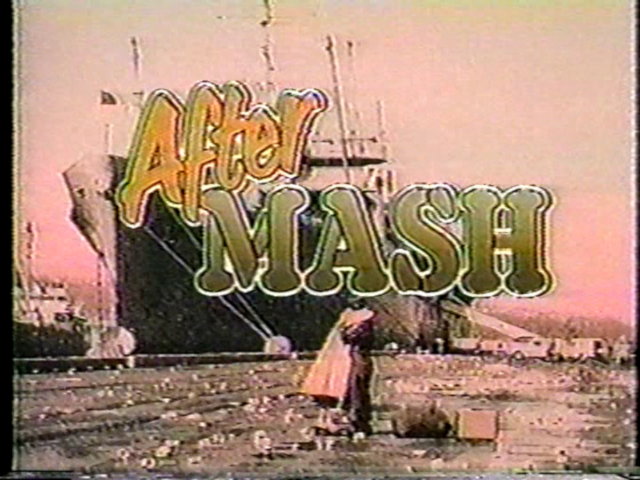
In season one, we are introduced to the new characters at the hospital as well as Mildred Potter (Barbara Townsend) and Soon-Lee. At the hospital, we meet the administrator Mike D’Angelo (John Chappell), his assistant Alma Cox (Brandis Kemp), and resident surgeon Dr. Gene Pfeiffer (Jay O. Sanders). There are also a number of residents in the hospital including one of Col. Potter’s former calvary mates from World War I, Bob Scannell (Patrick Cranshaw). Larry Gelbart returned to produce and write for the series. Gene Reynolds, Burt Metcalfe, and a number of the M*A*S*H writers also continued with AfterMASH. However, from the beginning, the series seemed to struggle to find a way to address the serious nature of working in a hospital while maintaining a comedic element. M*A*S*H had found that balance so well, but it was hard to replicate that in AfterMASH without the backdrop of war and without the ensemble cast of M*A*S*H. The series debuted on September 26, 1983, and it was first in the ratings. But the viewers didn’t stick around. By the end of season one, AfterMASH had fallen outside of the top twenty.
Despite the poor ratings, AfterMASH was picked up for another season. The second season saw a number of cast changes, character choices, and a time slot change that did not do the series any favors. Cast changes included a new chief administrator, Wally Wainwright (Peter Michael Goetz), and the role of Mildred Potter was recast and portrayed by Anne Pitoniak. By the end of the first season, actor David Ackroyd had joined the cast as Dr. Mark Boyer, a veteran who lost his leg in the Korean War. A psychiatrist, Dr. Lenore Dudziak (Wendy Girard), was also added to the main cast. Cast changes are hard to navigate, and there were too many characters in the series. But I believe that several storyline changes pushed away the audience. No character was damaged by these changes more than Klinger. At the end of the first season, Klinger was arrested for assaulting a real estate agent for talking him to a bad deal to buy a house for himself and the pregnant Soon-Lee. Klinger tries to prove he is crazy in the second season by wearing dresses, like he did in M*A*S*H. There’s a big difference though. In M*A*S*H, Klinger wore dresses to get out of a war. In AfterMASH, he wore dresses to get himself out from under charges for a crime that he did commit.
Unfortunately, AfterMASH never found its angle. Despite a guest appearance by Gary Burghoff, as Radar, in the first season, the series never recaptured the M*A*S*H magic. AfterMASH didn’t blaze any trails either as it was not the first show set in hospital. It wasn’t even the first M*A*S*H spin-off to take place in a hospital. Trapper John, M.D. (1979 – 1986) had already found a strong audience. As had the series St. Elsewhere (1982 – 1988), another medical drama set in a stateside hospital. The biggest differences between these shows and AfterMASH were that they were hour long dramas instead of a thirty minute comedy. and AfterMASH was set in a veterans hospital instead of a general hospital. The setting in a veterans hospital could have been an interesting angle that allowed for the human element that was ever present in M*A*S*H to continue. Unfortunately, network notes and changes, along with an uneasy balance, kept the series from finding its voice. However, there was one episode in season one that did come close to matching the tone of M*A*S*H. It was so well regarded that Gelbart earned an Emmy nomination for directing the episode. That episode was “Fallout” (01×11).
The Script

For fans of M*A*S*H who have followed my scripts posts, the AfterMASH script will look very familiar. Colorful script cover (though this one is tan) with the Twentieth Century Fox Logo in the bottom right corner. On the inside, things are familiar as well. This is a final draft of the script dated October 18, 1983. The episode was written and directed by Gelbart. “Fallout” was one of two episodes that he directed and one of two episodes that he wrote, but it was the only episode for which he is credited with both. As I mentioned in the introduction, this is an award winning episode largely due to Gelbart’s balanced writing style.
Unfortunately, this script does not have any of the production pages such as call sheets, a shooting schedule, or wardrobe pages like other scripts might. There are some markings throughout the script, however. Names of characters are underlined in the set directions, but there are no clues as to who might have owned this script. As with most scripts, it has its title page, but it also includes the “Cast List” and “Set List.” I haven’t written about those pages in the past, so I thought I would take this opportunity to briefly address each. The Cast List lists the name of each character appearing in the script. The regular cast members are listed first, and then there’s a space followed by the non-regular or single episode characters. It would then be up to the casting director and episode director to fill those roles. The Set List includes a rundown of all sets to be used in the episode. They are broken up by “Interiors,” sets that are inside a building, and “Exteriors,” sets that are outside of a building. Just because a set is “Exterior” does not mean that was filmed outside. Some outdoor sets are inside of a studio. The set director and art department would use this page to ensure that the sets were ready before the episode was filmed.
Much like the M*A*S*H script, the AfterMASH script tells the story of how an episode was created. Even without production documents, there is still a lot of information presented. The Cast List provides a rundown of the characters in the episode, the Set List tells us where the scenes take place, the stage directions tell us what, when, why, how, and who, and finally, the lines provide the dialogue for the episode. Taken all together, a script reads like a novel, but in a very unique format.
The Final Episode
After rewatching this episode, I was reminded of the potential that AfterMASH had. “Fallout” opens with Col. Potter and Mildred in their kitchen discussing his potential retirement. He is burnt out. He gets to the hospital and is promptly met by Klinger who needs some paperwork signed. Father Mulcahy is talking to a young couple who are expecting their third child. The husband, Joe Warner, hasn’t been feeling well, and he is being prepped for a biopsy. After Col. Potter and Dr. Pfeiffer complete the biopsy, they have a talk in Potter’s office about a job offer Dr. Pfeiffer received. He would be in private practice and make a substantially higher salary. Col. Potter reminds him that if he doesn’t complete his residency, he would never be board certified, and some people would never truly see him as a doctor. Dr. Pfeiffer agrees and said that he wasn’t going to take the job because the veterans’ hospital offered valuable experience, and it gave him the chance to work with Col. Potter. It is a nice moment between the doctors, but it doesn’t last.
The test results come back for Warner, and he has leukemia. Before Dr. Pfieffer can talk to him about his diagnosis, Warner is watching newsreels with other patients. One of the reels depicts a test of an atomic bomb, and Warner tells another patient that he has been a part of six of the tests on Enewetak Atoll, where the military tested atomic weapons. Dr. Pfieffer overhears this, and has Klinger gather some data for him. The data suggests that veterans exposed to radiation at weapons tests and were stationed in Japan after World War II have higher rates of leukemia and cancer. He believes that Warner’s leukemia is service related and that he is entitled to full benefits. Hospital administrator Mike D’Angelo meets with Col. Potter to discuss Dr. Pfeiffer’s request and denies it. He claims that there is no evidence to support the connection between atomic testing and cancer. This leads to Dr. Pfeiffer to reconsidering taking the job in private practice, but Col. Potter talks him out of it. Meanwhile, Warner has to come to terms with the diagnosis and talks with Father Mulcahy. He is understandably angry, and he asks Mulcahy, “You all lied. Now I am going to die. Just for doing what I was told. Why, Father? Why?” Father Mulcahy has no answer.
As I mentioned in the introduction, this episode earned Gelbart an Emmy nomination in 1984. The subject matter of the episode is real, and it was a debated topic in the early 1950s. The long term effects of radiation exposure had not been tested, so some soldiers were denied medical coverage despite their cancers likely being caused by association with the atomic bomb tests or time spent in Hiroshima and Nagasaki. Moments like this made M*A*S*H truly great. When the writers presented the characters with real world problems, it made the show relatable. This episode gets close. In this case, Warner was going to die, and the Army denied his claim of responsibility. That didn’t just affect his medical coverage, but it also affected the future of his young family. This is a situation that veterans faced in the 1950s, and it is well portrayed in this episode.
Unfortunately, as the eleventh episode of the series, the ratings for AfterMASH had already dropped before this episode aired. I believe this episode might have won some audience members had they seen it, and if the series had stuck to this formula. The episode had funny moments and dramatic moments, and that is what made M*A*S*H well balanced. AfterMASH had several valid criticisms. There were too many characters, too many cast changes, and the storylines ran from the melodramatic to the overly silly. The biggest downfall for the series, however, was the inevitable comparison to M*A*S*H. Some of the comparisons are unfair because the series was completely different, but others are valid. They did take three characters from the series, and try to build a new show around them. I maintain that it could have worked had more episodes been like “Fallout.”




